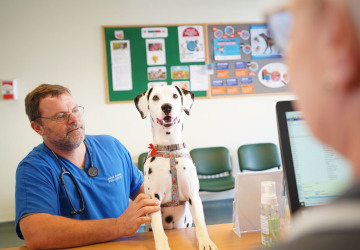
Our advice for avoiding Valentine’s Day disasters
February 14, 2019
Looking after your dog on Valentine’s Day
It’s the most romantic day of the year and a traditional time for gift-giving – but what’s special for you might be hazardous for your pooch. So before 14 February rolls around, read our handy tips, to understand the dangerous aspects of some traditional Valentine’s Day gifts.
It’s also a good idea to make a note of our emergency phone number here at Edgewood Veterinary Group in Purleigh (01621 828381) so you can contact us quickly if you’re worried your dog may have eaten something harmful. We’d much rather you contact us unnecessarily than your dog getting ill because of late treatment.
Valentine’s Day presents for dogs
Want to give your dog a Valentine’s treat? Make sure you steer clear of anything that could be harmful. Safe alternatives to sweets and chocolate include:
- A trendy collar
- An ID tag
- A new water or food bowl
- A dog chew toy
- Pet-friendly treats
- A cuddly toy
- A snuggly bed
- Insurance for vet’s fees
Don’t let your Valentine’s Day celebration end with a visit to the vet – read our tips now, and keep your pet safe from poisons.
Some harmful substances to be aware of:
Chocolate
- Contains theobromine, which is toxic to dogs
- Possible symptoms include vomiting, diarrhoea, hyperactivity, rapid breathing, incoordination, and seizures
Alcohol
- Acts as a central nervous system depressant
- Possible symptoms include vomiting, diarrhoea, incoordination, depression, difficulty breathing, tremors, and coma
Sweets
- Some sweets contain xylitol, which is poisonous to dogs
- Possible symptoms include vomiting, weakness, incoordination, depression or lethargy, tremors, seizures and coma
Flowers
- A few flowers are toxic to dogs if eaten
Candles
- It’s easy for a burning candle to be knocked over by a wagging tail
For all poisons
What to do if you think your dog has eaten something poisonous
- Contact your vet
- Note the time your dog ate the poison
- Try to estimate how much of the substance your dog has eaten; bring the vet any relevant packaging






